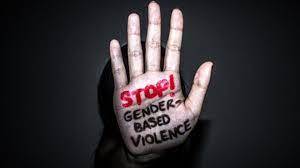
We need to address the patriarchy that persists in South Africa and engage with how it also robs men of personal autonomy and agency as they engage their own politics of identity, write Aphiwe Mhlangulana and Leballo Tjemolane.
Madoda Sabelani is a common phrase used to encourage men to respond to the prevalence and growing numbers of cases of gender-based violence (GBV) in the country.
This article is an expression of frustration with the continued violation of women and children in South Africa at the hands of men and the perceived deafening silence of men to this. South Africa, a country with a prevalence of rape cases and high rates of femicide, claims to be a free and liberated country where everyone's human right is protected. It is important not to take these stories as just numbers but to humanise the actual events and the experiences. This humanisation needs to also involve the naming and calling out of perpetrators.
On 16 May 2020, a post on Qaqambile Kolisa, a nurse at Linksfield Private Hospital who burned down his ex-girlfriend's flat, trended on Twitter. It was alleged that Kolisa burnt his ex-girlfriend's flat after she broke up with him. A follow-up tweet revealed how he felt justified in his actions.
Constant fear
Four days later, South Africans had moved on to a different case, where Major Bekezulu was suspected of killing Namhla Nozintaba, his long-term girlfriend. Images and conversations of the abuse circulated for several days with support of Namhla and her family growing. During the period of these two cases, many spoke about the constant fear and abuse that women in South Africa face.
In South Africa, violence is constantly directed at women and children's bodies despite much work being done around gender and sexual justice. Gender-based violence should never be considered only a women's problem. It is a societal problem, and me and you are what make up society. These cases are often underreported, and the statistics thus do not accurately describe the true scourge that is gender-based violence.
We are often conflicted between hope and despair. Hope when reading responses and actions where people show rage and concern about the prevalence of GBV and despair when the rage and conversations die out without any tangible actions or responses. When will it end? Why does it seem that men are entitled without contestation to women's bodies? This is a call upon all men in the country to start calling each other out explicitly and not just talk about calling each other out.
READ | OPINION: Juliana Claassens - We are taught to look away when GBV happens. We shouldn't anymore
Doing research with men on masculinity/ies within the South African context, specifically within religious and cultural discourses, has revealed a massive human and social problem we face. As society, we need better ways of addressing the hate and anger, we see embodied and articulated by men through inhuman violence on the bodies of women, children and men who are considered lesser than the 'ideal' articulation of masculinity. A constant theme in the data collected is the discovery that there is much work to be done by men in our country, and creating forums and campaigns just scratches the surface.
We need to address the patriarchy that persists in South Africa and engage with how it also robs men of personal autonomy and agency as they engage their own politics of identity. Patriarchy as a system is not only harmful to women, but it also does a great injustice to men.
Resentment
Where social expectations are not met, resentment creeps in, evolving into anger and rage that are unreasonable and not easily accounted for. As men, we are the worst oppressors of ourselves, of those we deem weak or the 'other', and this is because we ourselves are victims of a constructed system that perpetuates what Bell Hooks (2004) termed the Western imperialist white-supremacist capitalist patriarchy colonial project. The system that seems to privilege men has made men victim-perpetrators always ready to point responsibility to something or someone instead of owning up and taking responsibility.
Patriarchy follows the expression that all men are equal, but some men are more equal than others. Men need to be honest with themselves as men and human beings. It will only be through honesty that we can engage situations for what they are and not what we imagine them to be.
READ | OPINION: We need a lockdown on toxic masculinities
Media representations of black men have been made synonymous with toxic masculinity, as these are the cases that mainly sell the news. Through media representations, black men are highlighted and have 'shown themselves' not worthy of trust because of the most reported cases. Toxic masculinity has no race nor class. Noting what face is given to toxic masculinity in our quest to transform South Africa's gender landscape will make us see how the narrative that some men are better than others is sustained and protected.
When looking at reports of gender-based violence, the reality is that where gendered phenomena and experiences are concerned, toxic masculinity has a black face.
Men can learn a lot from the feminist movement in its quest to restore equality and justice for all. Men need to take time to listen to each other's stories and call each other out where there is a need. Maybe now, it is time for us to find a way of dealing with the social systems that alienate us from our humanness to a point where the actions carried out by men are so frightening and greatly violent.
“I am not asking you to apologise for your privilege, but I am asking you to see past it” - Amy Jo Hutchison
- Aphiwe Mhlangulana is a master’s student at the University of Cape Town and a member of the Unsettling Knowledge Production on Gendered and Sexual Violence in South Africa Project.
- Leballo Tjemolane is a PhD candidate at the University of the Western Cape’s Women and Gender Studies Department in the New Imaginaries in Gender and Sexual Justice Project.
*Want to respond to the columnist? Send your letter or article to opinions@news24.com with your name and town or province. You are welcome to also send a profile picture. We encourage a diversity of voices and views in our readers' submissions and reserve the right not to publish any and all submissions received.
Disclaimer: News24 encourages freedom of speech and the expression of diverse views. The views of columnists published on News24 are therefore their own and do not necessarily represent the views of News24.




 Publications
Publications
 Partners
Partners























